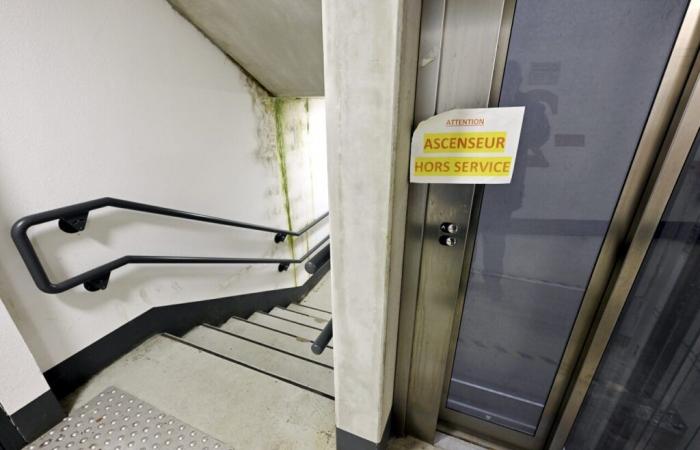Par
Thomas Martin
Published on
May 4, 2025 at 8:16 a.m.
One of the two elevators works. But he does not serve the floor where Chrislie Mouthoud lives, who must carry his two little girls every day to reach his apartment in the immense degraded condominium of Grigny 2 (Essonne). Every day, this 43 -year -old crèche assistant must take the elevator to the 11th floor and go back to foot to the 6th with her binoculars. Often helped by her 70 -year -old mother.
Ms. Mouthoud saw the “Calvary” described by the deputy Philippe Brun (PS) in the bill he carries to fight against the elevator breakdowns – 1.5 million per year according to the parliamentarian.
“A constant showdown”
In May 2023, after a fatal accident, the elevator was immobilized for the needs of the investigation. “This has resulted in enormous pressure on (the one) that worked, and an acceleration of its degradation,” explains the Directorate of Development, Housing and Urban Renewal of the Town Hall.
When AFP goes to this building, the only functional elevator only serves the eleventh and thirteenth floors. Tenant in this tower which is the subject of a requalification operation in social housing, Ms. Mouthoud feels “abandoned”.
To overcome the problems, emergency work funded by the State has been carried out and the municipality has set up a racing portage service. “We are trying to streamline information between the inhabitants, the union council, the provisional administrator (appointed by the court to administer the condominiums in serious difficulty, editor’s note), the public land establishment in Île-de-France (pilot of the project for the recovery of the condominiums of Grigny 2) and the ascensorist,” said the town hall.
But “it is a constant showdown between ascensorists and buildings of buildings,” she deplores, and “reactivity is not there” in exchanges with Otis, in charge of maintenance. Solicited, the company did not answer AFP questions.
The problem is not limited to degraded condominiums: according to the elevators’ federation, the National Park is dilapidated. A quarter of the devices are over 40 and 40% have exceeded 25 years.
“The real problem, it is on these dilapidated devices on which you do not have the parts,” explains its president Olivier Rouvière, “parts that are almost 40 years old, go find them on the market, it’s like repairing a 4L”.
At Marie-Pierre Gay, who lives in one of the rare Tours of Thiais (Val-de-Marne), the elevator has not been changed since its move… in 1983.
“The breakdowns is recurrent,” sighs this 63 -year -old retiree, whose husband died after a heart discomfort in July 2023. A SAMU team, called for help, had remained blocked in the elevator.
“I cannot certify that they would have saved it, but I tell myself that if it had been transported (at the hospital) right away, maybe he would still be there,” she confides tears in her eyes.
Contacted, the operator Schindler indicates that “modernization and installation standards” work was planned for 2025.
“Vandalism as everywhere”
Marie-Pierre Gay also requests financial compensation from her lessor and disputes a first payment of 22.34 euros paid to each of the 84 tenants, insufficient for her for a month’s breakdown.
When questioned, without eluding the question of missing documents, the donors highlight insecurity and vandalism, which, according to them, justifies up to two thirds of the interventions.
“Let us ask for the donors, it’s normal,” says Emmanuelle Cosse, president of the Social Union for Housing. “But (…) Today what we are undergoing is difficulty involving businesses”.
“There is vandalism like everywhere,” sweeps Noha Tefrit, parliamentary assistant to Philippe Brun at the origin of the angry elevator collective. According to her, the priority districts of city policy (QPV) like those of Marie-Pierre Gay and Chrislie Mouthoud are “a little abandoned” and benefit from less good quality contracts.
Ascensorists believe that the bill aimed at penalizing them in the event of exceeding the reparation period is “punitive” and risks “increasing the price of contracts in social housing” by five.
It would also force the owner of a building to provide support for occupants with reduced mobility.
Today, faced with the problems, in Grigny for example, “we tinker to counter in the emergency room”, we slip at the town hall.
Follow all the news in your favorite cities and media by registering for my news.
- #Accommodation
- #Social






